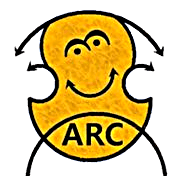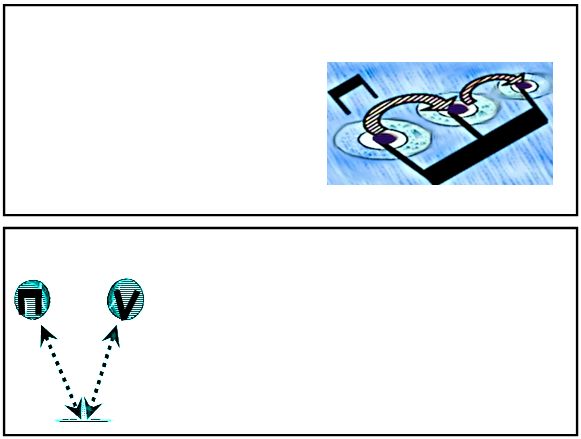Ricochet and Spiccato
Just as you can direct the motion when bouncing a ball or skipping a rock, you may direct the bow and create rebounding bow-strokes. Learning to control the bow requires focused experimentation.
RICOCHET is the technique of controlling bow rebound, performing notes in the same bow direction.
Ricochet is like “skipping a rock” in the sense that the bow springs off the string in rapid succession.
By directing the bow to ricochet in the same direction, multiple notes can be performed very rapidly.
Ricochet is a fancy bow trick!
SPICCATO is the technique of controlling bow rebound, performing notes by alternating bow direction.
Spiccato is like “bouncing a ball” in the sense that the bow springs off the string and then bounces the bow back into continued bow motion.
When bowing spiccato, you direct the bounce of Down-bows to rebound into Up-bows and vice versa.
Professional orchestra players always practice Spiccato.
Professional orchestra players always practice Spiccato.
Hi, ARC! Ricochet and Spiccato require lots of bow-arm flexibility.
Well-leveraged and skillful bow command is a must. Are you ready?
Well-leveraged and skillful bow command is a must. Are you ready?


Greetings, V!
Many arc-shaped motions direct ricochet and spiccato bow strokes, so naturally “yes,” I am always ready to assist. Here we go, let’s bounce!
Many arc-shaped motions direct ricochet and spiccato bow strokes, so naturally “yes,” I am always ready to assist. Here we go, let’s bounce!


Introducing the Bow Parts of the Bow The Stick Horse-Hair The Tip The Frog The Winding How the Bow Works
Rosin Preparing to Hold the Bow Stick Training Exercises Bowing Terminology Down-Bow Up-Bow
Bow-Hand Set-Up Finger Tasks and Functions The Thumb Meet ARC Finger Segments The Index-Finger
Bow-Hand Pronation The Center-Finger and Ring-Finger Bow-Hand Fulcrum Ring-Finger Propulsion Bass Bows
Pinky Bow-Tasks ‘Casting’ the Bow-Hand Bow-Wrist Tasks Rotational Inertia Arco Clay Smile Exercise Meet ANGLE
The Bow-Arm Box The Shoulder Arc Bow Contact-Point String Lanes Bow-Segment Mastery Bowing Exercises
Finding the Bow Contact-Point “Painting With Sound” Bowing Exercises Menu Bow Taps Bowing Traditions
Perform Down-Bows Perform Up-Bows The Art of the Bow-Change Articulations Staccato Legato
Mastery Checkpoint One Building Bow Control Bow Speed and Bow-Arm Motion Bow Planning and Distribution
Slow Moving Bow Strokes Individual Bow Segments Traveling the Bow Bowing Dynamics Mastery Checkpoint Two
Advanced Techniques Slurs and Articulations Slur Training Locating the Bow’s Balance Point Ricochet and Spiccato
Exploring Ricochet Ricochet Control Spiccato Training Spiccato Control Spiccato Brush Strokes
Multiple String Crossings Virtuosic Bow Strokes Arpeggio Bowing “Flying” Staccato Mastery Checkpoint Three
SCROLL’s List of Bow Strokes
Rosin Preparing to Hold the Bow Stick Training Exercises Bowing Terminology Down-Bow Up-Bow
Bow-Hand Set-Up Finger Tasks and Functions The Thumb Meet ARC Finger Segments The Index-Finger
Bow-Hand Pronation The Center-Finger and Ring-Finger Bow-Hand Fulcrum Ring-Finger Propulsion Bass Bows
Pinky Bow-Tasks ‘Casting’ the Bow-Hand Bow-Wrist Tasks Rotational Inertia Arco Clay Smile Exercise Meet ANGLE
The Bow-Arm Box The Shoulder Arc Bow Contact-Point String Lanes Bow-Segment Mastery Bowing Exercises
Finding the Bow Contact-Point “Painting With Sound” Bowing Exercises Menu Bow Taps Bowing Traditions
Perform Down-Bows Perform Up-Bows The Art of the Bow-Change Articulations Staccato Legato
Mastery Checkpoint One Building Bow Control Bow Speed and Bow-Arm Motion Bow Planning and Distribution
Slow Moving Bow Strokes Individual Bow Segments Traveling the Bow Bowing Dynamics Mastery Checkpoint Two
Advanced Techniques Slurs and Articulations Slur Training Locating the Bow’s Balance Point Ricochet and Spiccato
Exploring Ricochet Ricochet Control Spiccato Training Spiccato Control Spiccato Brush Strokes
Multiple String Crossings Virtuosic Bow Strokes Arpeggio Bowing “Flying” Staccato Mastery Checkpoint Three
SCROLL’s List of Bow Strokes



